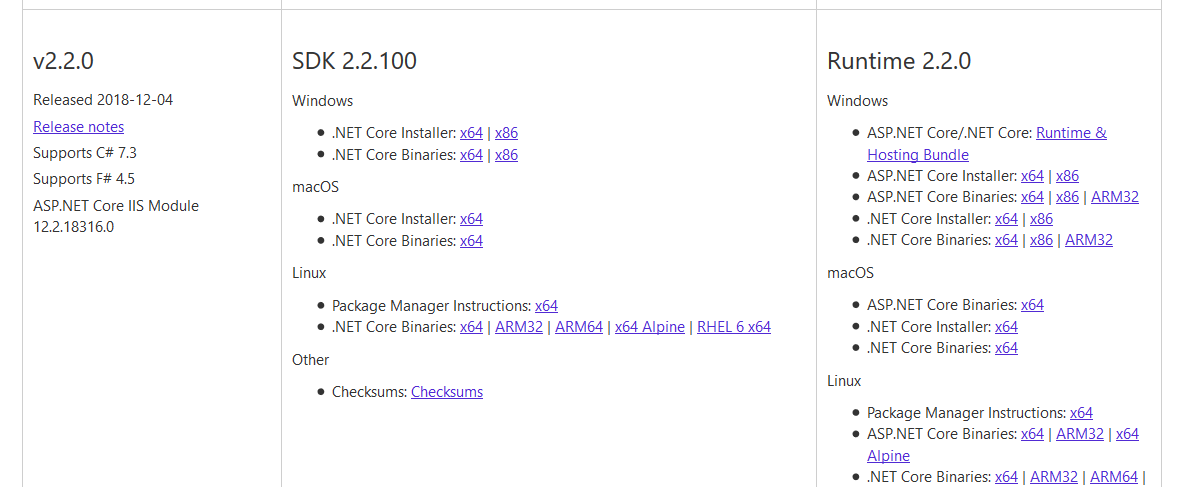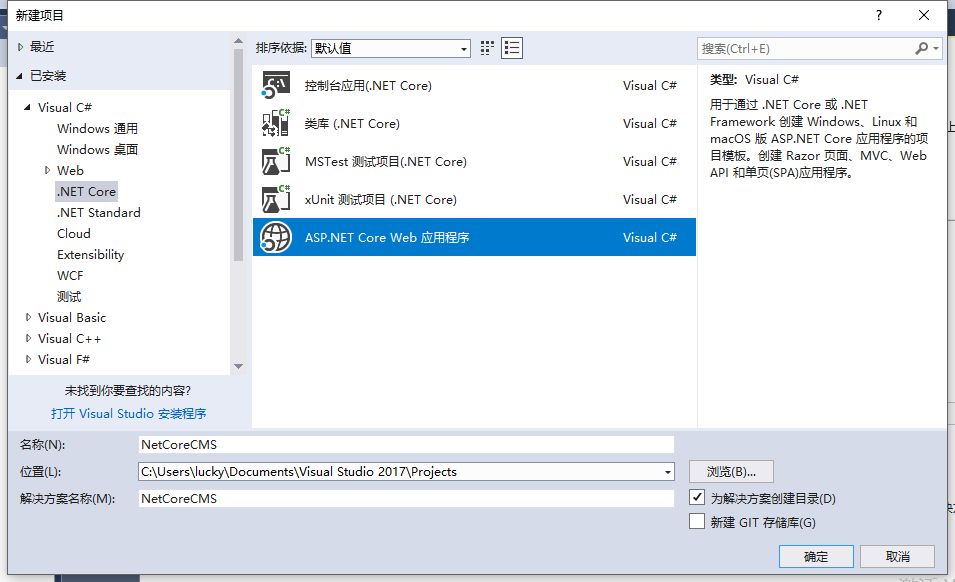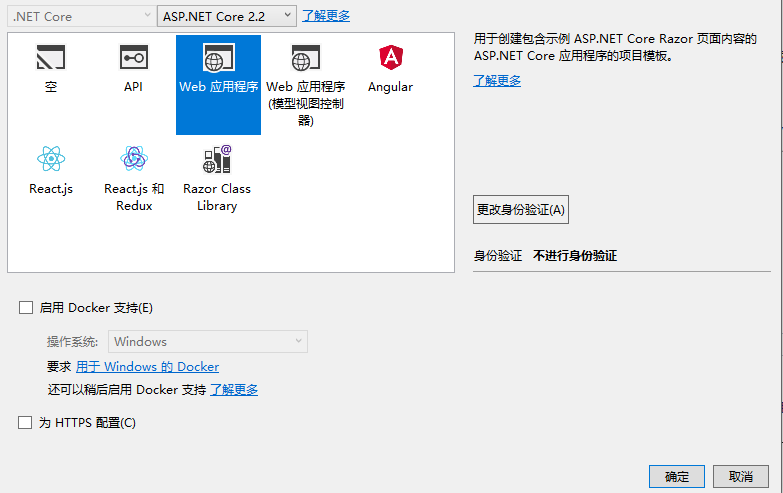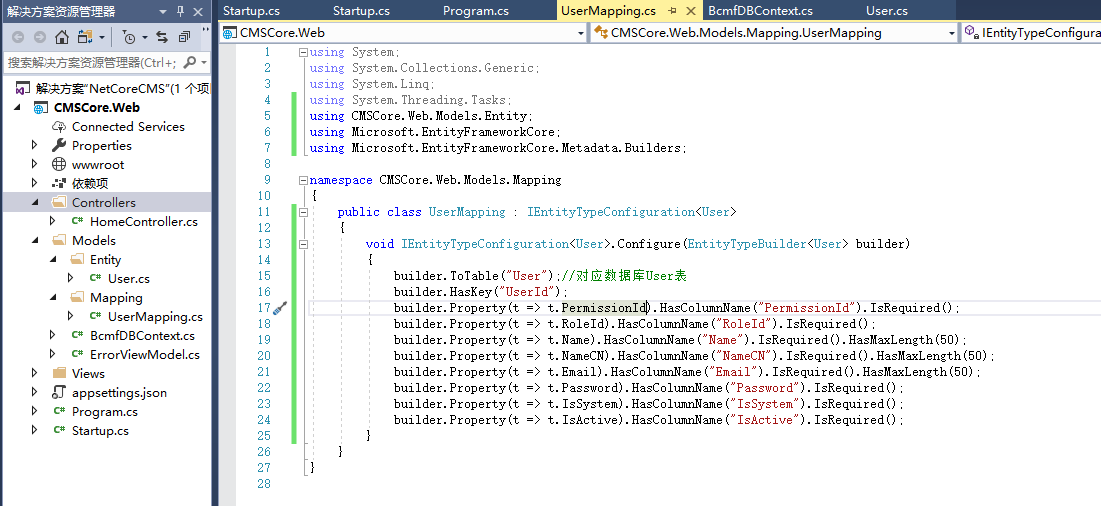创建NetCore2.2 Web项目+EFCore+SQLServer
在空余时间学习下NetCore,记录日常,供参考。
1.确保已下载安装NetCore2.2SDK 环境,下载地址:https://dotnet.microsoft.com/download/dotnet-core/2.2

2.打开VS2017,首先新建一个解决方案,并在解决方案上新建项目操作,选择ASP.NET Core Web 应用程序,点击“确定”。继续,NetCore版本选择ASP.NET Core 2.2,类型选择“Web应用程序”点击确定。


3、在appsettings.json添加配置数据库链接字符串,添加后如下图
{ "Logging": { "IncludeScopes": false, "LogLevel": { "Default": "Warning" } },
"AllowedHosts": "*", "ConnectionStrings": { "DefaultConnectionString": "Data Source=.;Initial Catalog=bcmf_core;User ID=sa;Password=123456" } }
4.NetCore2.2的SDK正常包含有Microsoft.EntityFrameworkCore和microsoft.EntityFrameworkCore.SqlServer,若没有,可以在NuGet包中查询安装,这里也是安装的2.2版本
NuGet官网:https://www.nuget.org/
搜索以上两个引用名称,获取安装命令行,在VS2017的程序包管理器控制台输入对应命令行,如下:

5.在Models文件夹新建文件夹“Entity”,在Entity下存放我们的数据实体类,新建实体类User.cs,这里视个人情况而定,我选择的是以前项目的一个测试数据库。
using System; using System.Collections.Generic; using System.Linq; using System.Threading.Tasks;
namespace NetCoreCMS.Models.Entity
{
public class User
{
public int UserId { get; set; }
public int PermissionId { get; set; }
public int RoleId { get; set; }
public string Name { get; set; }
public string NameCN { get; set; }
public string Email { get; set; }
public string Password { get; set; }
public bool IsSystem { get; set; }
public bool IsActive { get; set; }
}
/// <summary>
/// 返回模型类
/// </summary>
public class UserViewModel
{
public int UserId { get; set; }
public int PermissionId { get; set; }
public int RoleId { get; set; }
public string Name { get; set; }
public string NameCN { get; set; }
public string Email { get; set; }
public string IsSystem { get; set; }
public string IsActive { get; set; }
}
}
5、在Models文件夹新建文件夹“Mapping”,在Mapping下存放我们的数据实体映射类,新建实体类UserMapping.cs,

using System; using System.Collections.Generic; using System.Linq; using System.Threading.Tasks; using CMSCore.Web.Models.Entity; using Microsoft.EntityFrameworkCore; using Microsoft.EntityFrameworkCore.Metadata.Builders; namespace CMSCore.Web.Models.Mapping { public class UserMapping : IEntityTypeConfiguration<User> { void IEntityTypeConfiguration<User>.Configure(EntityTypeBuilder<User> builder) { builder.ToTable("User");//对应数据库User表 builder.HasKey("UserId"); builder.Property(t => t.PermissionId).HasColumnName("PermissionId").IsRequired(); builder.Property(t => t.RoleId).HasColumnName("RoleId").IsRequired(); builder.Property(t => t.Name).HasColumnName("Name").IsRequired().HasMaxLength(50); builder.Property(t => t.NameCN).HasColumnName("NameCN").IsRequired().HasMaxLength(50); builder.Property(t => t.Email).HasColumnName("Email").IsRequired().HasMaxLength(50); builder.Property(t => t.Password).HasColumnName("Password").IsRequired(); builder.Property(t => t.IsSystem).HasColumnName("IsSystem").IsRequired(); builder.Property(t => t.IsActive).HasColumnName("IsActive").IsRequired(); } } }
6、在Models文件夹新建上下文BcmfContext.cs类
using CMSCore.Web.Models.Entity; using CMSCore.Web.Models.Mapping; using Microsoft.EntityFrameworkCore; namespace CMSCore.Web.Models { public class BcmfDBContext : DbContext { public BcmfDBContext(DbContextOptions options) : base(options) { }
public DbSet<User> User { get; set; }
protected override void OnModelCreating(ModelBuilder modelBuilder) { modelBuilder.ApplyConfiguration(new UserMapping()); base.OnModelCreating(modelBuilder); } } }
7、在入口文件注册上下文,在根目录Startup.cs的ConfigureServices方法中,注册上下文。
不要忘记了添加引用命名空间
using Microsoft.EntityFrameworkCore;
using Microsoft.EntityFrameworkCore.SqlServer;
// This method gets called by the runtime. Use this method to add services to the container. public void ConfigureServices(IServiceCollection services) { services.Configure<CookiePolicyOptions>(options => { // This lambda determines whether user consent for non-essential cookies is needed for a given request. options.CheckConsentNeeded = context => true; options.MinimumSameSitePolicy = SameSiteMode.None; }); services.AddMvc().SetCompatibilityVersion(CompatibilityVersion.Version_2_2); //注册数据库操作上下文 services.AddDbContext<BcmfDBContext>(option => option.UseSqlServer(Configuration.GetConnectionString("DefaultConnectionString"))); }
8、在Controller文件夹下,创建控制器UserController.cs
using System; using System.Collections.Generic; using System.Linq; using System.Threading.Tasks; using CMSCore.Web.Models; using CMSCore.Web.Models.Entity; using Microsoft.AspNetCore.Mvc; // For more information on enabling MVC for empty projects, visit https://go.microsoft.com/fwlink/?LinkID=397860 namespace CMSCore.Web.Controllers { public class UserController : Controller { private readonly BcmfDBContext db; public UserController(BcmfDBContext _db) { db = _db; } // GET: /<controller>/ public IActionResult Index() { var userList = db.User.Where(m => m.IsActive).Select(t => new UserViewModel { Email = t.Email, IsActive = t.IsActive ? "激活" : "禁用", IsSystem = t.IsSystem ? "是" : "否", Name = t.Name, NameCN = t.NameCN, PermissionId = t.PermissionId, RoleId = t.RoleId, UserId = t.UserId }); return Json(userList); } } }
运行、访问/user/index,成功获取用户信息


 浙公网安备 33010602011771号
浙公网安备 33010602011771号